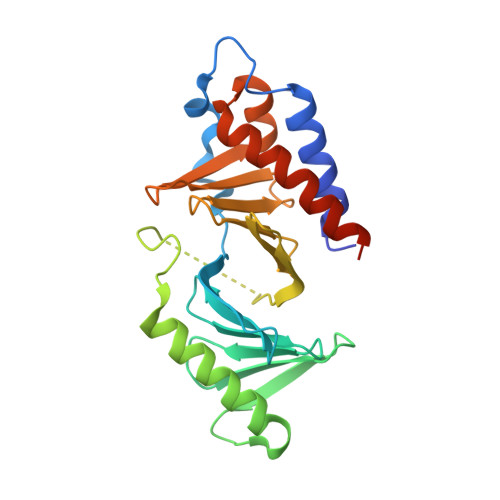A cryptic hydrophobic pocket in the polo-box domain of the polo-like kinase PLK1 regulates substrate recognition and mitotic chromosome segregation.
Sharma, P., Mahen, R., Rossmann, M., Stokes, J.E., Hardwick, B., Huggins, D.J., Emery, A., Kunciw, D.L., Hyvonen, M., Spring, D.R., McKenzie, G.J., Venkitaraman, A.R.(2019) Sci Rep 9: 15930-15930
- PubMed: 31685831
- DOI: https://doi.org/10.1038/s41598-019-50702-2
- Primary Citation of Related Structures:
5NFU, 5NJE - PubMed Abstract:
The human polo-like kinase PLK1 coordinates mitotic chromosome segregation by phosphorylating multiple chromatin- and kinetochore-binding proteins. How PLK1 activity is directed to specific substrates via phosphopeptide recognition by its carboxyl-terminal polo-box domain (PBD) is poorly understood. Here, we combine molecular, structural and chemical biology to identify a determinant for PLK1 substrate recognition that is essential for proper chromosome segregation. We show that mutations ablating an evolutionarily conserved, Tyr-lined pocket in human PLK1 PBD trigger cellular anomalies in mitotic progression and timing. Tyr pocket mutations selectively impair PLK1 binding to the kinetochore phosphoprotein substrate PBIP1, but not to the centrosomal substrate NEDD1. Through a structure-guided approach, we develop a small-molecule inhibitor, Polotyrin, which occupies the Tyr pocket. Polotyrin recapitulates the mitotic defects caused by mutations in the Tyr pocket, further evidencing its essential function, and exemplifying a new approach for selective PLK1 inhibition. Thus, our findings support a model wherein substrate discrimination via the Tyr pocket in the human PLK1 PBD regulates mitotic chromosome segregation to preserve genome integrity.
- The Medical Research Council Cancer Unit, University of Cambridge, Hills Road, Cambridge, CB2 0XZ, United Kingdom.
Organizational Affiliation:

















